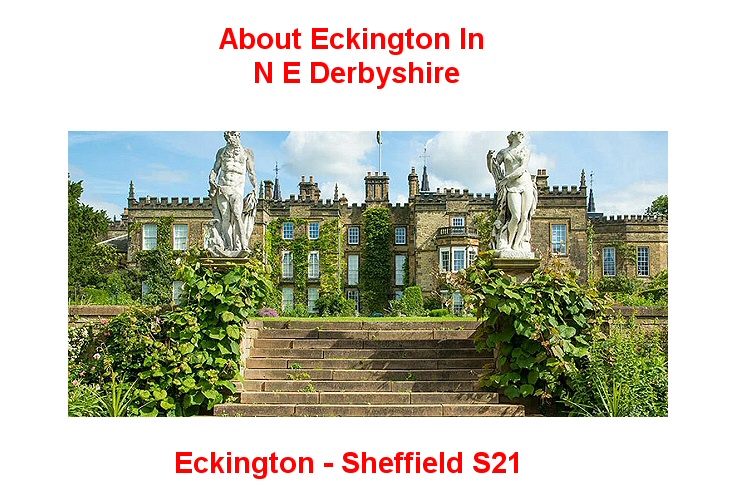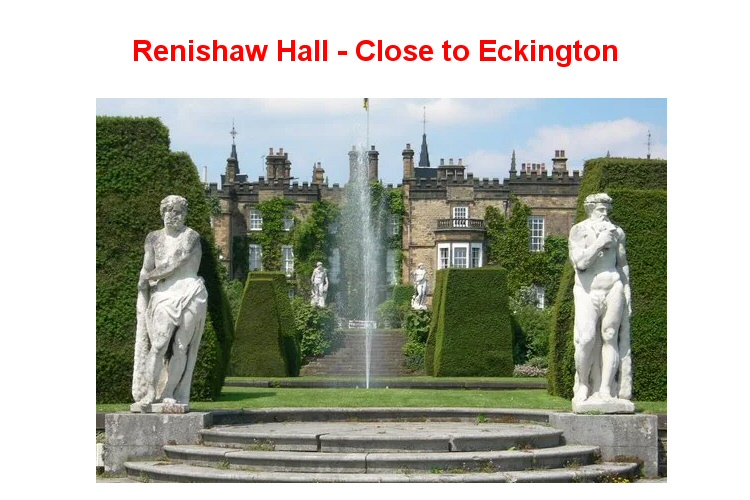
| The UK's leading online hire directory | Home | About | Categories | Tool Hire | Articles | Links | Site Map | © www.hireitlocal.co.uk | Terms and Conditions |


All About Eckington in North East Derbyshire - History and Today
Featured Local Suppliers
Hopkinson Waste
Eckington Road, Staveley Lane, Chesterfield, S43 3YQ Tel: 01246 430080

Eckington: A Historic Village that is located in North East Derbyshire, close to Sheffield
Introduction to the village of Eckington:
Nestled within the scenic landscape of North East Derbyshire (between Chesterfield, Dronfield, and the City of Sheffield), the small village of Eckington offers a rich tapestry of history, culture, and community.
Eckington is a quintessential old English village, steeped in centuries of history,
characterised by its picturesque surroundings, and supported by a tight-
This website article in the www.hireitlocal.co.uk website delves into the history,
geography, culture, and contemporary significance of Eckington, as well as featuring
local businesses and other useful information relevant to Eckington, providing an
in-
Its Historical Background:
Eckington's history can be traced back over a millennium. The village was mentioned in the Domesday Book of 1086.
An extensive survey of England was commissioned by the famous William the Conqueror.
At that time, Eckington was recorded as "Eckingtone," meaning "Ecca's farmstead".
This indicated its origins as a small agricultural community. This early reference
highlights the village's long-
During the medieval period, Eckington grew in prominence due to its strategic location on the edge of the large (and much needed at its time) Derbyshire coalfield. The village's economy was predominantly agricultural, but it also benefited from the presence of natural resources, particularly coal and also ironstone.
The local landscape, characterised by gently rolling hills and fertile valleys, was ideal for agriculture, while the underlying geology provided valuable minerals that would become increasingly important in the centuries to come.
Eckington during the Industrial Revolution:
The Industrial Revolution of the 18th and 19th centuries in the UK brought significant changes to the village of Eckington. The exploitation of coal and ironstone in the area led to the development of strong mining and associated industries. Eckington's transformation from a predominantly agricultural village to an industrial hub was marked by the growth of its population and the expansion of infrastructure, including the construction of new housing, several schools, and churches to accommodate the burgeoning workforce.
The village's industrial heritage is still very much evident today, with several
historical buildings and landmarks serving as reminders of its past. The former Eckington
Colliery, once a major employer in the area, is now a site of historical interest,
and the village's architecture reflects its industrial roots, with a mix of traditional
stone cottages and many Victorian-
Geography and Local Environment:
The location of Eckington is situated in the north-
The proximity to the park is one of Eckington's most appealing features, providing ample opportunities for outdoor activities such as hiking, walking, cycling, and bird watching. It is also home to some of the best roads in the UK, making it very popular for motorcyclists with its encouraging bends, twists, and rises and falls on its roads.
The local environment is characterised by a varied mix of rural and urban elements. The surrounding countryside is dominated by farmland, with fields of wheat, barley, and other crops interspersed with vast patches of woodland. The River Moss, a tributary of the large River Rother, runs through the village, adding to its picturesque charm. The river and its surrounding habitats support a variety of wildlife, including kingfishers, otters, and a large range of bird species.
The village itself is divided into several distinct areas, each with its own unique character. The historic core of Eckington is centered around the Church of St. Peter and St. Paul, this is a Grade I listed building that dates back to the 12th century. This Norman church, with its imposing tower and intricate stone carvings, is a focal point of the village and a testament to its long history.
Surrounding the church are a number of traditional cottages and also more modern homes, reflecting the village's evolution over the centuries.

About Renishaw:
To the north of the village lies the district of Renishaw. This is very closely associated
with the Sitwell family, one of Derbyshire's most prominent land-
Renishaw Hall, the family's ancestral home, is a stunning example of a typical large
English country house, it is set within very extensive gardens and parkland. The
hall is open to the public during advertised dates and hours, and offers a glimpse
into the lives of the British aristocracy, as well as showcasing an impressive collection
of art and historical artefacts. Its gardens are also a very strong feature of this
property -
It is located only 1.1 mile from the central area of Eckington, being a typical 3 minute journey by car.
Community and Culture:
Eckington is known for its strong sense of community, with a range of local organizations and events that bring residents together. The village has a number of community groups, including sports clubs, historical societies, and arts organizations, all of which contribute to a vibrant and active local culture.
One of the most notable cultural events in Eckington is the annual Well Dressing festival, a tradition unique to Derbyshire and neighboring counties. Well dressing involves the creation of intricate designs made from natural materials such as flowers, leaves, and seeds, which are then used to decorate local wells. The origins of this tradition are unclear, but it is believed to have pagan roots, later adapted by Christians as a way of giving thanks for clean water. Eckington's well dressing festival is a highlight of the village's cultural calendar, attracting visitors from across the region.
In addition to the Well Dressing festival, Eckington hosts a number of other community
events throughout the year. These include the Eckington Show, a traditional country
fair featuring livestock displays, craft stalls, and entertainment for all ages,
and the Christmas lights switch-
The village is also home to a number of public houses, cafes, and restaurants, which serve as important social hubs. The George and Dragon, a historic pub located in the heart of the village, is particularly popular with locals and visitors alike. With its cozy interior, traditional décor, and a menu featuring locally sourced ingredients, it offers a quintessential English pub experience.
Education and Local Services:
Eckington is well-
In terms of healthcare, Eckington has its own medical center, providing primary care services to residents. The village is also within easy reach of larger hospitals in Sheffield and Chesterfield, ensuring that more specialized medical care is readily accessible.
Transport links are another important aspect of life in Eckington. The village is
well-
Modern Developments and Challenges:
Like many rural communities in the UK, Eckington has faced a number of challenges
in recent years. The decline of traditional industries, such as coal mining, has
had a significant impact on the local economy, leading to job losses and a shift
towards service-
One of the key developments in Eckington has been the growth of the housing market, with new residential developments being built to meet the demand for housing in the area. These developments have attracted new residents to the village, bringing with them new skills, ideas, and energy. However, this growth has also raised concerns about the impact on the village's character and the strain on local infrastructure.
Another challenge facing Eckington is the need to balance economic development with environmental sustainability. The village's location on the edge of the Peak District National Park means that it is subject to strict planning regulations designed to protect the natural environment. While these regulations are important for preserving the area's beauty and biodiversity, they can also make it difficult to attract new businesses and create jobs.
Despite these challenges, there are many reasons to be optimistic about Eckington's future. The village has a strong sense of identity and a committed community that is actively involved in shaping its future. Initiatives such as the Eckington Neighbourhood Plan, which sets out a vision for the village's development over the coming years, demonstrate the community's proactive approach to managing change and ensuring that Eckington remains a vibrant and attractive place to live.
Notable Residents:
Eckington has been home to several notable individuals throughout its history. One of the most famous residents was Sir George Sitwell, a prominent landowner and politician who lived at Renishaw Hall. Sir George was known for his eccentric personality and his passion for architecture and gardening, which is reflected in the design of Renishaw Hall and its gardens. The Sitwell family has continued to play an important role in the village, with Renishaw Hall remaining a key cultural and historical site in the area.
Another notable figure associated with Eckington is the poet Edith Sitwell, who was born at Renishaw Hall in 1887. Edith Sitwell was a leading figure in the literary world of the early 20th century, known for her innovative and experimental poetry. Her works, including the famous poem "Facade," have left a lasting legacy, and she is remembered as one of England's most distinctive and influential poets.
Overall:
Eckington is a village that embodies the rich history and vibrant culture of rural England. From its origins as an agricultural settlement mentioned in the Domesday Book to its transformation into an industrial hub during the 19th century, Eckington has a story that is deeply intertwined with the broader history of Derbyshire and the UK. Today, the village continues to thrive, balancing tradition and modernity in a way that reflects the resilience and adaptability of its community.
With its stunning natural surroundings, strong sense of community, and rich cultural heritage, Eckington is more than just a place to live – it is a place to experience and enjoy. Whether exploring the historic sites, participating in local events, or simply enjoying the tranquility of the countryside, there is something for everyone in this charming Derbyshire village. As Eckington continues to evolve, it remains a testament to the enduring appeal of village life in the heart of England.